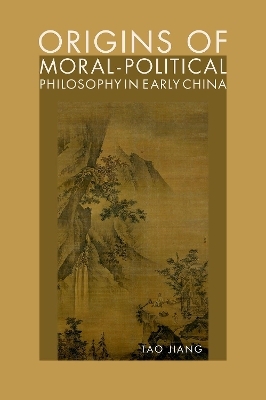
Origins of Moral-Political Philosophy in Early China
Oxford University Press Inc (Verlag)
978-0-19-761136-4 (ISBN)
This book offers a new narrative and interpretative framework about the origins of moral-political philosophy that tracks how the three normative values, humaneness, justice, and personal freedom, were formulated, reformulated, and contested by early Chinese philosophers in their effort to negotiate the relationship among three distinct domains, the personal, the familial, and the political. Such efforts took place as those thinkers were reimagining a new moral-political order, debating its guiding norms, and exploring possible sources within the context of an evolving understanding of Heaven and its relationship with the humans. Tao Jiang argues that the competing visions in that debate can be characterized as a contestation between partialist humaneness and impartialist justice as the guiding norm for the newly imagined moral-political order, with the Confucians, the Mohists, the Laoists, and the so-called fajia thinkers being the major participants, constituting the mainstream philosophical project during this period. Thinkers lined up differently along the justice-humaneness spectrum with earlier ones maintaining some continuity between the two normative values (or at least trying to accommodate both to some extent) while later ones leaning more toward their exclusivity in the political/public domain. Zhuangzi and the Zhuangists were the outliers of the mainstream moral-political debate who rejected the very parameter of humaneness versus justice in that discourse. They were a lone voice advocating personal freedom, but the Zhuangist expressions of freedom were self-restricted to the margins of the political world and the interiority of one's heartmind. Such a take can shed new light on how the Zhuangist approach to personal freedom would profoundly impact the development of this idea in pre-modern Chinese political and intellectual history.
Tao Jiang teaches at Rutgers University in New Brunswick, NJ. His research interests include pre-Qin classical Chinese philosophy, Mahayana Buddhist philosophy, and cross-cultural philosophy. He is the author of Contexts and Dialogue: Yogacara Buddhism and Modern Psychology on the Subliminal Mind (University of Hawai'i Press, 2006) and the co-editor of The Reception and Rendition of Freud in China (Routledge, 2013). He is chair of Religion Department and director of Center for Chinese Studies at Rutgers. Jiang co-chairs the Neo-Confucian Studies Seminar at Columbia University as well as the Buddhist Philosophy Unit at the American Academy of Religion. He serves on the editorial boards of several leading Asian and comparative philosophy journals.
Introduction
Part I: Humaneness-cum-Justice: Negotiating Humans' Relationship with Heaven
Chapter 1: Ritual and Ren in Confucius' World: Humaneness-cum-Justice at the Incipience of Chinese Moral-Political Philosophy
Part II: Humaneness versus Justice: Grappling with the Familial-Political Relationship Under a Naturalizing Heaven
Chapter 2: The Great Divergence: Mozi and Mencius on Justice and Humaneness
Chapter 3: Justice and Humaneness in a Naturalist Cosmos: Laozi's Dao and the Realignment of Values
Chapter 4: Modeling the State after Heaven: Impartiality in Early Fajia Political Philosophy
Part III: Personal Freedom, Humaneness, and Justice: Coming to Terms with the State Under a Naturalized Heaven
Chapter 5: Zhuangzi's Lone Project of Personal Freedom
Chapter 6: Xunzi's Synthesis of Humaneness and Justice: Ritual as the Sages' Partnership with Heaven and Earth
Chapter 7: Universal Bureaucratic State as the Sole Agent of Justice in Han Feizi's Thought
Conclusion: Regime of Self-Cultivation and Tragedy of Personal Freedom
| Erscheinungsdatum | 13.09.2021 |
|---|---|
| Verlagsort | New York |
| Sprache | englisch |
| Maße | 231 x 157 mm |
| Gewicht | 771 g |
| Themenwelt | Geisteswissenschaften ► Philosophie ► Ethik |
| ISBN-10 | 0-19-761136-2 / 0197611362 |
| ISBN-13 | 978-0-19-761136-4 / 9780197611364 |
| Zustand | Neuware |
| Haben Sie eine Frage zum Produkt? |
aus dem Bereich


